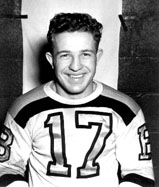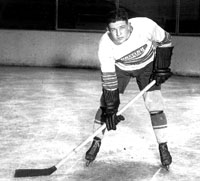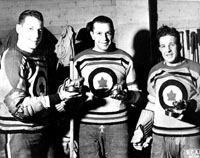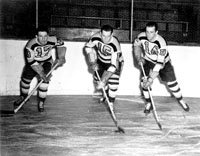

Bobby Bauer
Veteran Players' Category
Robert Theodore Bauer fused skillful play and sportsmanship very
successfully during ten years spent with the Boston Bruins. He earned
much acclaim as the right winger on the famed "Kraut Line" with Milt
Schmidt and Woody Dumart. Bauer totalled 260 points in 328 NHL contests
in a career that was interrupted by his service with the Royal Canadian
Air Force during World War II.
|
|
Born in Waterloo, Ontario on February 16, 1915, Bauer played city league
hockey before heading to Toronto. Once there he gained valuable training
by splitting the 1932-33 season between the British Consols and Toronto
National Sea Fleas of the Toronto Mercantile League. Bauer helped the
latter outfit win the league championship that year. This was followed
by a rewarding stint with the St. Michael's College juniors in 1933-34.
Bauer's stellar play was an integral factor behind the club's Memorial
Cup triumph that season. Bauer returned to his roots by spending the
1934-35 campaign with the Kitchener Greenshirts which he led to the OHA
Junior championship.
|

 The Boston Bruins were aware of Bauer's talent and moved quickly to sign
him. He was then dispatched to the Boston Cubs of the Canadian-American
Hockey League where the Bruins could monitor his development over the
1935-36 season. Bauer did not look out of place during his first year of
professional hockey. He accumulated 15 goals and 28 points and was
considered good enough to play with the Providence Reds of the
International American Hockey League the following year. Bauer tallied
fourteen times for the Reds in 1936-37 and earned an emergency call up
to Boston where he scored a goal in his only NHL contest. It was also in
Providence that he was first teamed with Milt Schmidt and Woody Dumart
to form a potent troika.
The Boston Bruins were aware of Bauer's talent and moved quickly to sign
him. He was then dispatched to the Boston Cubs of the Canadian-American
Hockey League where the Bruins could monitor his development over the
1935-36 season. Bauer did not look out of place during his first year of
professional hockey. He accumulated 15 goals and 28 points and was
considered good enough to play with the Providence Reds of the
International American Hockey League the following year. Bauer tallied
fourteen times for the Reds in 1936-37 and earned an emergency call up
to Boston where he scored a goal in his only NHL contest. It was also in
Providence that he was first teamed with Milt Schmidt and Woody Dumart
to form a potent troika.
Bauer enjoyed a promising twenty-goal rookie campaign in 1937-38 while
becoming a necessity in the Bruins line-up. That same year the Kraut
Line debuted and contributed significantly to Boston finishing atop the
American Division standings. During each of the following three seasons
Boston finished first in the NHL standings and won the Stanley Cup in
1939 and 1941. Bauer himself won consecutive Lady Byng Trophies in 1940
and 1941 as the NHL's most gentlemanly player.
Towards the end of the 1941-42 season, Bauer's career shifted
dramatically. With World War II raging, he and linemates Schmidt and
Dumart became the first big league players to join the Royal Canadian
Air Force. Initially they were based in Ottawa and played for the RCAF
Commandoes who were participating in the Quebec Senior Hockey League.
That spring they led the club to the Allan Cup championship. The
following year the Kraut Line was stationed in Halifax where they won
the city championship. The next season this squad continued to function
but as an independent outfit. Bauer and his linemates spent the 1943-45
period in service to their country.
|

 Bauer returned to Boston for two more seasons from 1945-46 to 1946-47.
In the former his play was particularly strong during the post-season
when he aided the Bruins' drive to the Stanley Cup Final. In the latter
he enjoyed a personal best 30 goal season and won his third Lady Byng
Trophy.
Bauer returned to Boston for two more seasons from 1945-46 to 1946-47.
In the former his play was particularly strong during the post-season
when he aided the Bruins' drive to the Stanley Cup Final. In the latter
he enjoyed a personal best 30 goal season and won his third Lady Byng
Trophy.
On retiring in 1947, Bauer returned to his hockey origins by coaching
the Guelph Biltmore Juniors. Later that year he regained his amateur
status and embarked on a highly successful career with the senior
Kitchener-Waterloo Dutchmen. Bauer's strong influence took the squad to
the OHA Senior finals three straight years between 1948 and 1950. He
retired as a player at the conclusion of the 1949-50 season but did
return for one game with Boston in 1951-52. On March 18, 1952, Bauer
scored a goal and an assist as the Kraut Line reunited for one night to
lead the Bruins to victory over the New York Rangers.
|

 A talent for communicating with players was evident throughout Bauer's
career. Thus it was a natural progession for him to step into the realm
of coaching when his playing days were completed. Beginning in 1952, he
went on to serve as general manager, coach and president of the
Kitchener-Waterloo Dutchmen. Under his tutelage the club won two OHA
Senior championships and two Allan Cups. The second Allan Cup triumph
resulted in the Dutchmen being chosen to represent Canada at the 1956
Cortina Olympics where they won the bronze medal. On returning to
Canada, Bauer retired from coaching. Four years later he was convinced
to coach the Dutchmen at the 1960 Squaw Valley Olympics where the team
won the silver medal.
A talent for communicating with players was evident throughout Bauer's
career. Thus it was a natural progession for him to step into the realm
of coaching when his playing days were completed. Beginning in 1952, he
went on to serve as general manager, coach and president of the
Kitchener-Waterloo Dutchmen. Under his tutelage the club won two OHA
Senior championships and two Allan Cups. The second Allan Cup triumph
resulted in the Dutchmen being chosen to represent Canada at the 1956
Cortina Olympics where they won the bronze medal. On returning to
Canada, Bauer retired from coaching. Four years later he was convinced
to coach the Dutchmen at the 1960 Squaw Valley Olympics where the team
won the silver medal.
Following the 1960 Olympic tournament, Bauer passed along his experience
during countless sessions with his younger brother, Father David Bauer.
Prior to his death in 1964, Bobby Bauer helped devise the concept and
implementation of Canada's future national team program.
|